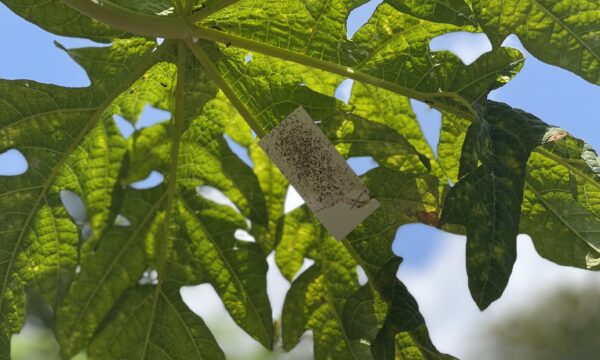By Wei Zhang. Reblogged from Agrilinks.
 Every time you see a ladybug—also known as the ladybird beetle—you should tuck it in your wallet as a lucky charm to bring prosperity, according to the folklore of many countries. There’s a grain of truth in the old stories. Research shows that each ladybird in a cotton field in the North China Plain provides an economic benefit to farmers of at least 0.05 yuan, or one U.S. cent. This may not sound like much, but consider: Doubling the current ladybird density in two-thirds of Chinese cotton fields could bring farmers around $300 million per year.
Every time you see a ladybug—also known as the ladybird beetle—you should tuck it in your wallet as a lucky charm to bring prosperity, according to the folklore of many countries. There’s a grain of truth in the old stories. Research shows that each ladybird in a cotton field in the North China Plain provides an economic benefit to farmers of at least 0.05 yuan, or one U.S. cent. This may not sound like much, but consider: Doubling the current ladybird density in two-thirds of Chinese cotton fields could bring farmers around $300 million per year.The value comes from the ladybird’s hunger for aphids, which destroy cotton plants. Chinese farmers are mostly unaware of the advantages of this form of natural pest control, however, so they generally kill aphids using chemical insecticides. Long seen as the easiest and most affordable pest control method, insecticides are used on a mass scale worldwide.
But chemical insecticide use suppresses the services nature offers for free. Ladybirds are vicious aphid predators. Unleashed onto a field, it is estimated that one ladybird can kill 50 aphids per day, or some 5,000 in its lifetime.
Combining insect sampling and household surveys, our research found significant economic benefits from ladybird beetles (for insect geeks, there are three main species: Harmonia axyridis, Propylea japonica and Coccinella septempunctata). We’ve calculated that each adult beetle provides services worth $0.01 per year, even alongside substantial insecticide use.
Chinese fields host about 13,500 ladybirds per hectare on average. Doubling this density could potentially increase farmers’ income by $93.67 per hectare. Spread that across two-thirds of the cotton acreage in China, and that’s $290.8 million pumped into the economy per year.
Encouraging the proliferation of ladybird beetles could address more than the aphid problem. There are health and environmental benefits to farmers and society if chemical insecticide use is reduced. Excessive use of insecticides by Chinese farmers carries environmental costs as the chemicals infiltrate food, water and ecosystems. Insecticide exposure can cause negative health effects to farm workers, consumers, residents and livestock. Excessive pesticide use also disrupts natural pest suppression systems—killing ladybirds and other beneficial insects—feeding a vicious cycle of increasingly frequent outbreaks as pests develop resistance to chemical treatments.
Finally, pesticides can also undermine the profitability of farms. Insecticide use is expensive and can put farmers on a “pesticide treadmill” where they forgo other solutions. China’s farmers could bolster their long-term bottom line by purchasing less insecticide.
Our research shows that the less pesticides farmers use, the more ladybirds can expand their aphid-killing services. If we cut current, excessive insecticide use of 22.35 kilograms per hectare by three quarters, the marginal value of the ladybirds would rise more than two and a half times, from $6.98 to $17.6 per hectare.
Once such biological control services begin to flourish, farmers may reduce insecticide use even further, though additional incentives may be needed. Meanwhile, the economic value of ladybird beetles and other natural predators may rise, creating the kind of virtuous cycle that sustainable agriculture urgently needs.
These findings provide a strong economic, health and environmental case for policies that encourage farmers to move away from chemicals and provide them more support to reduce pest risks via natural means.
Unfortunately, many farmers and policymakers lack basic knowledge about natural pest control. What can be done? First, researchers and policy makers should continue to quantify and disseminate the hidden benefits of biological pest controls. To reach farmers, agricultural extension services should better explain the health risks and adverse environmental effects of agrochemicals and make communicating findings on natural pest control a priority.
Read the original post on Agrilinks→
Read more: Uncovering the economic value of natural enemies and true costs of chemical insecticides to cotton farmers in China
1 Comment
Leave a Reply
Related News & Blogs
5 common chilli pests and diseases
Chilli pests and diseases can considerably impact crop production. Not only can pest and disease outbreaks lead to severe yield losses, but they also reduce quality and lower market value. In many countries, including India, Bangladesh, Malawi, and Tha…
12 June 2025





[…] Swapping Pesticides with Beetles Could Put Money in Farmers’ Pockets […]